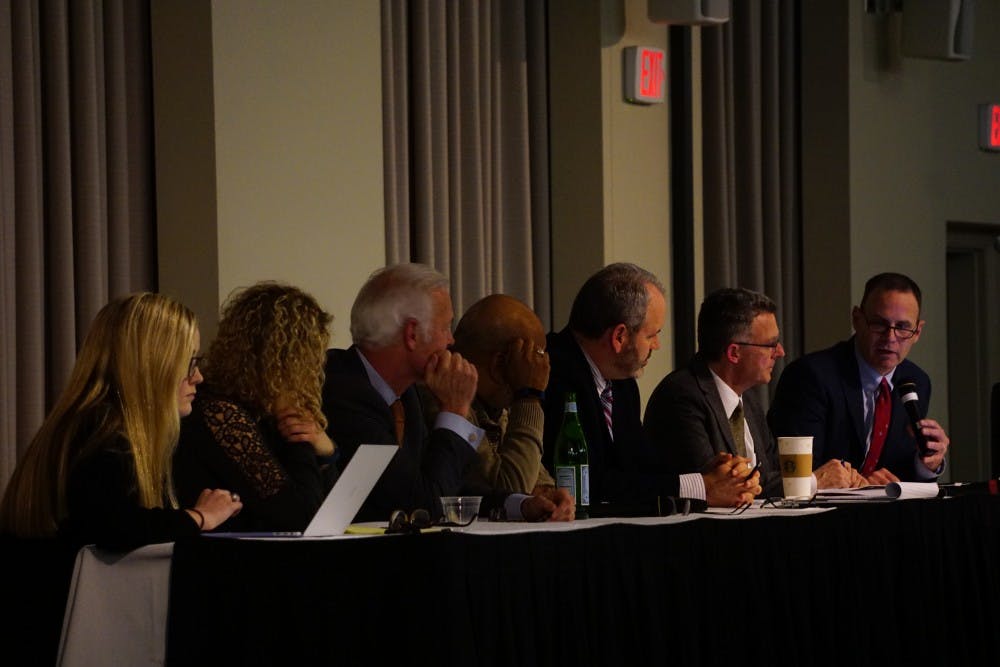On Wednesday, Miami will kick off a series of four interactive discussions, open to students, staff and faculty, that are designed to facilitate scholarly understanding of national and global issues.
Dubbed the "Inclusion Series," the initiative was conceived by Miami's senior leadership in the fall, and Provost Phyllis Callahan sought proposals on session topics from faculty members.
One such proposal came from political science department chair Patrick Haney, who along with dean of students Mike Curme will be moderating Wednesday's panel discussion, "Free Speech and the Path to a More Perfect Union", in the Shriver Dolibois Rooms at 5 p.m.
"Our republic needs to constantly be reminded that it's an experiment in self-government. The experiment can fail, and it can fail for a lot of reasons," Haney said. "One of the ways that this experiment in self-government can fail is if we have a sort of breakdown about a willingness to talk about and confront difficult issues."
As catalysts for the free-speech forum, Haney cited what he called a "contentious" presidential election, flyers that circulated campus in December promoting a pro-white, "alt-right" blog and Breitbart editor Milo Yiannopoulos' visit to campus as part of his "Dangerous Faggot" tour.
"A lot of people [were] saying, 'Is that acceptable?' 'Is it legal?' 'Is it OK?' 'What can I do about it?'" Haney said. "[It] seemed like a good time to kind of step back and say, 'OK, let's start at least by going over some basics and we can go from there.'"
The result will be Wednesday's session, which comes just over a week after President Donald Trump's inauguration and will discuss constitutional law surrounding free speech as well as ways the university can make its students feel welcome.
Representing the political science department in the panel will be Haney, Bruce Petrie, an instructor who also serves as a J.D. partner at the Cincinnati-based law firm Graydon, assistant professor Rachel Blum, and senior political science major and student body president Maggie Reilly.
Also on the panel are Rodney Coates, a professor of global and intercultural studies, and John Forren, an assistant professor of justice and community studies.
Haney said he and Curme will pose several questions to the panel during the two-hour event, then open the floor to questions solicited from the audience via Twitter and Google Docs.
"I think that what [the Inclusion Series] does is to highlight the idea that this is a place where it's important to be open to new ideas, to confront new ideas, [to be] willing to consider other perspectives and think about how that might lead to a different level of commitment to your own political values," Haney said.
Panelist Forren, of the justice and community studies department, said Wednesday's event will draw attention to free speech as a particularly pertinent issue on Miami's campus.
Enjoy what you're reading?
Signup for our newsletter
"If anything, the concern about free speech is playing out generally in society is especially acute on a college campus because we value freedom of inquiry and freedom of expression so much," Forren said. "When someone comes to a college campus, they should be expected to be challenged and confronted with ideas they're not comfortable with. It's part of the educational process. At the same time, you have a right to come to a college campus and feel safe and feel like you are being respected and be free of harassment and personal attack. Where you draw that line is always a struggle."
Haney said he feels that Miami is "not an extremely politically active campus," using as an example Yiannopoulos' trip to Oxford, which proceeded as scheduled, while some of the controversial speaker's other campus visits, including at DePaul University in Chicago and several University of California campuses, were shut down.
"I think on the one hand, that's good in the sense that it indicates that Miami students are kind of in the middle," Haney said. "They're generally sort of open-minded about things. I think they're willing to entertain different kinds of ideas, as opposed to that reaction that says, 'If it's a view I don't agree with, I don't want to hear it.'
"On the flip side, though, I think Miami students, at some level, could be a little more politically active. It wouldn't be the end of the world to see a little more picketing on campus."
Haney added that his ultimate priority is for campus to continue the political conversation.
"I like the idea that we can build on a community that, in general, is open-minded, is willing to entertain different kinds of ideas and, again, in general, is, I think, oriented towards civil discourse," he said. "It's not required that one be civil in their discourse. The Constitution doesn't say you have to be, but I think things work out better if you are."
That's the goal of the Inclusion Series, which will also hold sessions on March 14, April 11 and May 4.




